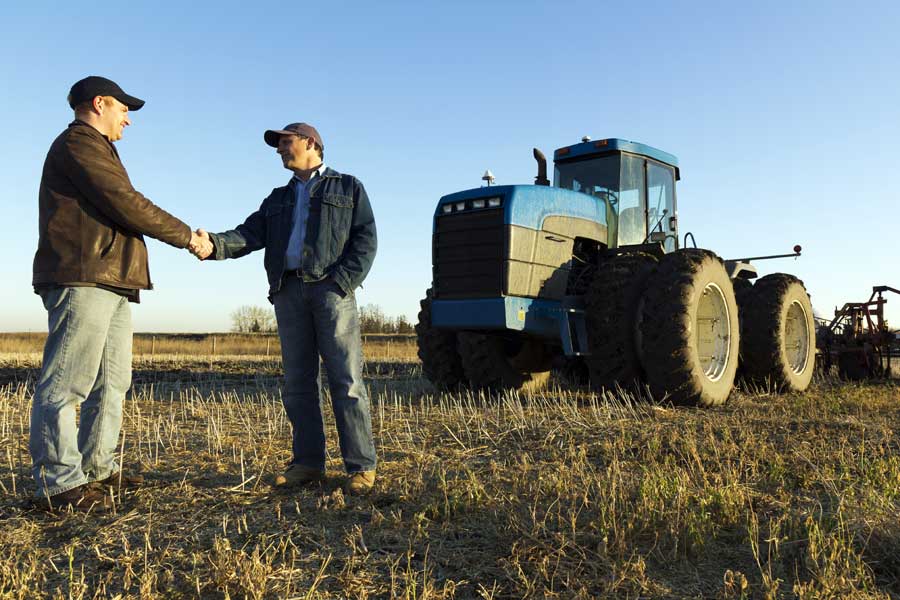It’s not a bad thing to seek outside advice — as long as it’s good advice. No matter how smart you are, you can’t be aware of all your options and opportunities.
We all need great input that we can ruminate on, evaluate and implement, and this great input must come from people we are confident will give us the best advice. They need to be people we trust and that we can talk to openly, because we have to talk to them about the most important things in our lives — our families, our dreams, and our money.
Read Also

Youth motivated to find answers to today’s agricultural challenges
This is the first in a series of articles exploring the perspectives and experiences of young people who are finding…
Are you getting the best business advice? Even if you think your answer is yes, get ready for 2015 by asking your financial advisers these five questions.
1. Does our farm align with your current client portfolio targets?
Both the company they work for and your advisers themselves likely have goals that they are working towards. Those are goals that can change. So even if your business matched the criteria your adviser was targeting initially, that may no longer be the case.
Asking this sort of question also offers your adviser an opportunity to share their career path plans with you. Farmers may never plan to truly retire, but other people do and your financial advisers may be among them. Or perhaps they just plan to cut back their workload in the coming year. Maybe they’re aspiring to make a move up the corporate ladder. If you have advisers who are comfortable enough with you and are permitted to divulge this information, then you might get the chance to plan ahead for any imminent changes.
More importantly, this question will help you assess changes within your own operation and whether your adviser remains compatible or not.
Brenda Stefanson is a regional farm business management specialist for Saskatchewan’s Ministry of Agriculture who says even if your farm hasn’t physically changed, outside forces may be having an impact. “The assets farmers control, in Saskatchewan and right across the country, are much more valuable than they were even 10 years ago,” Stefanson says.
Farmers may own the same amount of land, for instance, but today it’s worth much more money than when it was originally purchased, so it may require new financial management strategies. “I have had some farmers come in here and talk about dissatisfaction with their regular adviser just because of that issue,” Stefanson says.
There’s no one reason farmers start to feel out of sync with their current advisers, but Stefanson rattles off a number of common ones she hears about regularly: “their outlook has changed, their goals have changed, or there’s a younger generation involved that changes the risk tolerance of the farm.”
With all the many advisers out there, Stefanson says you don’t have to just put up with someone who has become a bad fit with your business.
But don’t throw out the baby with the bathwater, warns Lloyd Steier, professor of strategic management at the University of Alberta School of Business. Steier says a great example is when the next generation inherits the family farm and envisions major business changes. “New products, new markets, new strategies, growth; all those things may necessitate bringing on new advisers,” he says. “But inherited businesses come with social capital, something built up over years, and that’s an incredible resource.”
Social capital includes things such as outstanding favours, community goodwill, and your reputation within the industry. So before you fire the adviser who sang at your father’s funeral, Steier suggests acting out of respect for previous good service by keeping up old relationships while you build new relationships into your team that are more consistent with your new intentions.
2. Are any of our farm’s 2015 objectives unclear to you?
Whether you’re talking in the ultra-long term, or even if you’re just thinking through all the jobs you’ve got to get done today, farm management is really a series of what, when, who, where, and why questions.
Adding up those questions then helps you think your way through to a strategy that you can use to prioritize your business activities for the rest of the year. What do you really want to accomplish, and how are you going to accomplish it?
Sharing this strategic plan with your adviser provides them with important context, so you want to make sure your advisers understand it well. “Strategy should drive structure,” says Steier, who then adds, “strategy should also drive what you’re doing.” Sporadically seeking a little legal, accounting, and banking advice when you need it might be enough for a “Mom and Pop” farm that owns a little bit of land and a couple of tractors, but complex operations need more.
“Typically, operations have evolved to be fairly complex, in terms of costs and assets, but still use very informal governance mechanisms that really don’t fit with where they need to go,” Steier says. “Farmers are running multimillion dollar companies and they haven’t moved beyond coffee shop-type forums as their major source of advice.”
Steier says he doesn’t mean that the informal advice you get from peers is worthless. In fact, he believes it is the most cost-effective way for someone starting up to get some really good input. But for the same reasons you don’t use a horse and plow to farm 1,000 acres, you can’t expect to make million-dollar decisions really well without sophisticating these systems as well.
Clients who don’t outline their strategic plans to their adviser do so at their own peril, says Don Shaughnessy of the Protector’s Group in Peterborough, Ont. Often, however, Shaughnessy finds the clients can’t outline their strategic plans because they haven’t articulated them for themselves.
“Most of the people I talk to have never asked themselves the ‘W’ questions,” Shaughnessy says. “Because of that, the adviser takes over by default and they end up driving the bus.”
To understand why that’s a recipe for disaster, he says consider this: good financial planning breaks down into strategic, tactical, and logistical layers. Business owners must be responsible for the first layer, since no one else can define the values of the business. As experts in the tactical field, advisers provide the second layer, and then collaborate in implementing that plan during the final phase with the business owner.
If you don’t bring a good strategic layer to start with, Shaughnessy says the tactical discussions can become confusing, so it’s hard to make choices. “If the client comes with a strategic idea, the client and the adviser actually have some sort of reasonable working relationship,” Shaughnessy says. “If your possible solution has come through a tactical door, one of the things you’ll find is people aren’t especially good at sharing blame.”
One way Shaughnessy says you can keep your strategic conversations clear is to eliminate precise details from the discussion. “In strategic planning, precision is of no value whatsoever,” he explains. “All you’re looking for is direction.” In other words, this is a good time to only use round numbers. Shaughnessy says to think of it like you would a connect-the-dots drawing. All the points have to be there for the right picture to emerge, but look too hard at the size or shape of any one dot and you lose sight of the larger image. “Strategic planning is just organized common sense, there’s nothing magic about it,” he says. Still, he says he never had any trouble providing advice to farm clients who could clearly outline their plan for him.
3. What professional development opportunities would you recommend for us?
One thing Stefanson, Steier and Shaughnessy all agree on is that while farmers today are better educated than ever, the pressure is on to get even more highly trained. Go to workshops. Read magazines. Watch webinars. Talk to government representatives who can channel unbiased information to you. Seek new ideas.
“You have to go outside of your social system to learn something new,” Steier says. “You have to bring in other resources.”
In sociology textbooks, the idea you want to build on is called the strength of weak ties. It describes how cultivating relationships with many acquaintances improves access to fresh ideas even more than strengthening all your closest relationships.
Some of your most valuable network connections could prove to be old dorm mates, your hired hand’s brother or your dental hygienist. Steier says this is why it’s wise to grow your team of advisers when you’re making major changes to your business. “I don’t advocate switching advisers so much as broadening your advisory capacity,” he says.
4. What services should we consider outsourcing this year?
Outsourcing specific services is one way you can use your current advisers to help in the process of broadening advisory capacity. Perhaps monthly bookkeeping has become more than the family can handle, and so it waits until the cropping season is over. Your accountant may suggest that it’s time to bring in a professional.
Stop before you just call in the person your accountant suggests though. “You’re going to pay this person a substantial amount of money, you’re going to work very closely with them over a period of time, and the advice they give you will guide you in some of the most important decisions you will make,” says Stefanson. In many ways, this person is about to become a new farm employee, so she urges farmers to prepare themselves accordingly.
When you choose a new outside resource, interview at least three people. “I would say interview five, but three seems to be as much time as people want to put into it,” she says. Why so many? “You want something to compare to because the first person you interview might have a great sales pitch you fall for hook, line, and sinker.”
Make sure it is someone who listens, she adds. “I’ve been in this situation as a farmer myself,” Stefanson says. “I’ve gone to look for advice and I felt like the adviser wasn’t listening to what I wanted.”
Stefanson also recommends asking for a resumé and three to five references from every adviser you interview. Don’t just look at the list of names and expect that’s enough confirmation. Before you sign any contracts, call these farmers and ask them about their satisfaction with the adviser’s work, how easy it is to get a hold of the adviser, and if they’ve ever been surprised by extra fees.
5. Can we get that in writing?
Stefanson says you want a contract with your adviser not for legal protection so much as for clarity’s sake.
“You can have a conversation with somebody and hear different things,” Stefanson says. “If it’s written down and you agree to the wording, then that’s what’s agreed on.” This prevents simple little misunderstandings or confusion as a result of jargon, and it can help you stick to budgets better. A contract or letter of agreement lays out what services will be provided, by certain dates, and what costs will be associated with them including things like hourly fees and mileage.
No matter who comes to see her, Stefanson says cost is always part of her discussions, and it always seems to be an issue. “We’re often reluctant to pay,” agrees Steier. “If you want to get good quality advice, you have to be willing to pay for it.”
Steier’s top advice is to beware of false saving. “I’ve seen people go out and spend $300,000 to $400,000 on a combine and then they have a do-it-yourself will kit,” Steier says. “When those people passed away, they create multimillion dollar problems just to save $10,000 in legal costs.”
Good advice comes at a cost, Steier says. But it also delivers value, he adds, so make sure to always buy the absolute best advice you can afford.



















